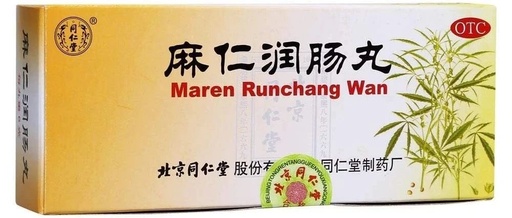 “The Fu Yang (Foot Yang) pulse is floating and rough; when floating, the stomach qi is strong, and when rough, urination is frequent. The combination of floating and rough leads to hard stools, indicating a deficiency in the spleen. Ma Zi Ren Wan is the remedy for this condition.” This formula was created by Zhang Zhongjing for the syndrome of “strong stomach, weak spleen, and fluid deficiency leading to dry intestines,” pioneering the method of moistening and purging for constipation. It exemplifies the treatment of spleen deficiency with a focus on moistening and promoting bowel movements. This article connects classical theory with clinical practice, deeply analyzing the essence of this formula.
“The Fu Yang (Foot Yang) pulse is floating and rough; when floating, the stomach qi is strong, and when rough, urination is frequent. The combination of floating and rough leads to hard stools, indicating a deficiency in the spleen. Ma Zi Ren Wan is the remedy for this condition.” This formula was created by Zhang Zhongjing for the syndrome of “strong stomach, weak spleen, and fluid deficiency leading to dry intestines,” pioneering the method of moistening and purging for constipation. It exemplifies the treatment of spleen deficiency with a focus on moistening and promoting bowel movements. This article connects classical theory with clinical practice, deeply analyzing the essence of this formula.
1. Composition and Dosage of the Formula
Composition of Ma Zi Ren Wan::
-
Ma Zi Ren (Hemp Seed): 2 sheng (20g, peeled)
-
Shao Yao (Peony Root): 0.5 jin (15g)
-
Zhi Shi (Bitter Orange): 0.5 jin (15g, roasted)
-
Da Huang (Rhubarb): 1 jin (10g, peeled)
-
Hou Po (Magnolia Bark): 1 chi (10g, roasted, peeled)
-
Xing Ren (Apricot Kernel): 1 sheng (10g, peeled and cooked)
2. Analysis of the Ingredients
Ma Zi Ren: Sweet and moistening, nourishes the spleen and alleviates dryness
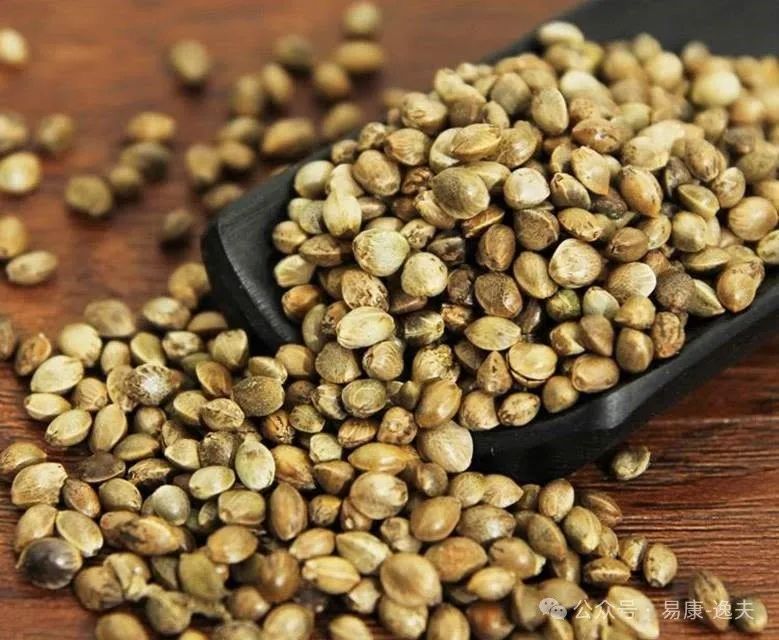
Ma Zi Ren is sweet and neutral, entering the spleen, stomach, and large intestine meridians, serving as the monarch herb. It is rich in oils, moistening without being greasy, promoting bowel movements without harming the body’s qi, particularly adept at nourishing the fluids of the intestines.
Da Huang: Clears heat and promotes bowel movements, pushing out the old to make way for the new
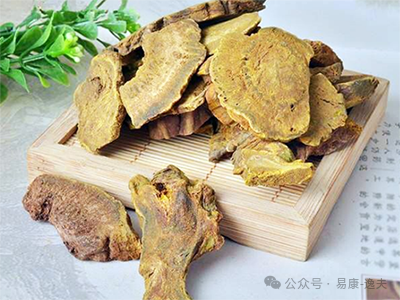
Da Huang is bitter and cold, entering the spleen, stomach, and large intestine meridians, serving as the minister herb. It clears accumulated heat in the stomach and intestines, promoting the passage of dry stools, working in harmony with Ma Zi Ren to balance moistening and purging.
Zhi Shi: Breaks qi stagnation, eliminates accumulation, and relieves fullness
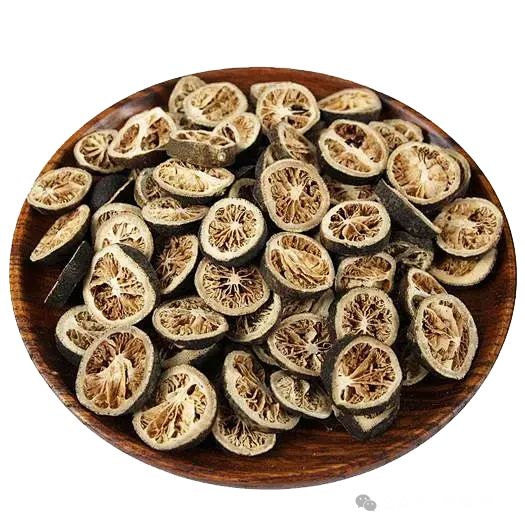
Zhi Shi is bitter and slightly cold, entering the spleen, stomach, and large intestine meridians. Its strong and penetrating nature effectively breaks up qi stagnation in the gastrointestinal tract, particularly adept at alleviating abdominal distension caused by food stagnation and promoting the downward flow of qi. When paired with Da Huang, it balances the actions of breaking qi and clearing heat, effectively cleansing the intestines.
Hou Po: Moves qi, dries dampness, and relieves fullness
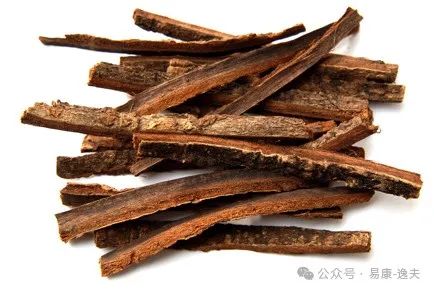
Hou Po is bitter, spicy, and warm, entering the spleen, stomach, lung, and large intestine meridians. It warms the middle jiao like the spring sun melting ice, promoting the flow of stagnant qi. Its spicy and bitter properties specifically address abdominal fullness and distension caused by qi stagnation, working in tandem with Zhi Shi to form a “dual-edge” approach to breaking qi stagnation.
Shao Yao: Softens the liver, nourishes yin, and alleviates pain
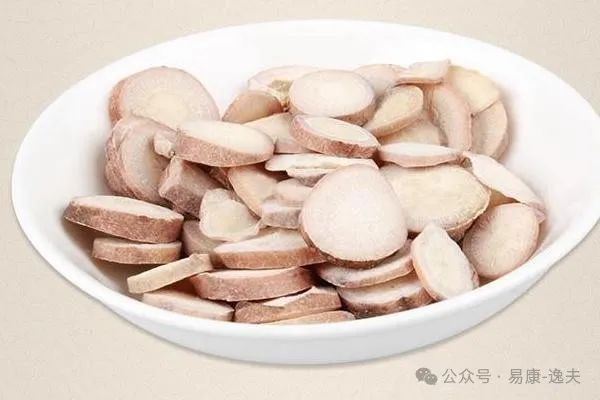
Shao Yao is sour and cold, entering the liver and spleen meridians. It nourishes the liver and protects the yin, preventing excessive purging from Da Huang and Zhi Shi from harming the body’s fluids. Its synergy with Ma Zi Ren balances the moistening of the intestines and nourishing of the liver, embodying the principle of “Yin and Yang originating from the same source” in treating constipation while preserving the root.
Xing Ren: Opens the lungs, moistens the intestines, and promotes downward flow
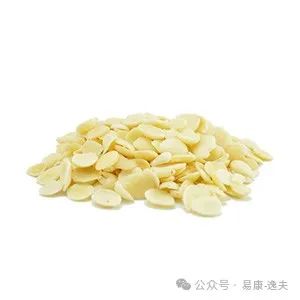
Xing Ren is bitter and warm, entering the lung and large intestine meridians. It opens the lungs to promote the flow of qi, assisting in the downward movement of fluids. Its oily nature lubricates the intestines, while its bitter properties help to lower qi, complementing the actions of Ma Zi Ren and Hou Po, effectively revealing the intricate relationship between the lungs and intestines.
3. Clinical Application Analysis
The Fu Yang pulse, located on the dorsum of the foot, reflects the condition of “spleen deficiency” quite interestingly. Food enters the stomach, passes through the duodenum, and then into the small intestine. Although the small intestine is narrow, it can easily accumulate residue at its bends. If the spleen is overly dry and hot, excessive thinking can damage the spleen, leading to issues. Mencius stated, “Thinking without learning leads to laziness,” while Dr. Ni Hai Xia metaphorically compared it to “stools resembling Liu Wei Di Huang Wan,” indicating that stools become as dry as sheep dung.
Under normal circumstances, when a person drinks water, it disperses in the Yangming meridian, partially transforming into the fluids in gastric juice, while some flows into the small or large intestine. In the large intestine, water is reabsorbed. However, if the spleen is overly dry, water quickly evaporates after entering the stomach, being absorbed by the spleen, which does not require additional moisture, causing it to flow directly to the bladder, resulting in frequent urination. The moisture from food should be fully absorbed in the large intestine, but instead, it is taken by the spleen in the small intestine, leading to dry stools that form hard pellets, which should be a smooth stool but instead become large, dry stools stuck in the large intestine or resembling “Liu Wei Di Huang Wan” in the small intestine.
Knowing that dry stools are stuck in the small intestine, using mangxiao (Glauber’s salt) may be too aggressive. Therefore, Ma Zi Ren is chosen, as its seeds contain oil that can moisten the intestines; paired with Xing Ren, which also has a moistening effect. When tonifying the spleen, Gui Zhi Tang is typically used, but since the spleen is already dry, the warming nature of Gui Zhi would exacerbate dryness, so it is replaced with Bai Shao (White Peony). Bai Shao can invigorate the spleen’s venous circulation and alleviate pain. These three herbs are combined with Xiao Cheng Qi Tang, which promotes the small intestine, and adding Ma Zi Ren, Xing Ren, and Bai Shao can effectively expel dry stools from the small intestine. Using only Xiao Cheng Qi Tang may clear the stools, but small pellets may remain stuck at the bends of the small intestine, requiring the gentle action of the seeds to clear them.
Zhang Zhongjing used pills for their slow and targeted effects; decoctions act too quickly and may not clear everything, while pills can gradually clear the condition. This syndrome is more common in women, and after using Ma Zi Ren Wan, symptoms improve. If there is still difficulty, a small amount of mangxiao can be taken.
When prescribing, the ratio should be: 2 parts Ma Zi Ren, 6 parts Bai Shao, 6 parts Zhi Shi, 12 parts Da Huang, 12 parts Hou Po, and 12 parts Xing Ren. This formula is particularly effective for elderly constipation. However, although this formula is gentle, it is ultimately a purging agent, and misuse can be fatal. For elderly patients with dry blood and constipation, using a large dose of Rou Cong Rong (Cistanche) can be effective. If this formula is used, although there may be temporary relief, constipation may worsen soon after, which should not be overlooked.
Commonly, elderly patients have stools resembling sheep dung. Rou Cong Rong can tonify the kidneys and strengthen essence, and once physical strength is restored, intestinal peristalsis increases, leading to natural bowel movements. Elderly individuals with weak constitutions may not tolerate the potency of Xiao Cheng Qi Tang. In emergencies, pig bile or honey decoction methods can be used to clear stools from the rectum.
Key Pathogenesis:
-
Strong Stomach, Weak Spleen: Able to eat but experiences abdominal distension, with a slightly yellow tongue coating and little moisture
-
Fluid Deficiency and Dry Intestines: Dry and hard stools that are difficult to pass, with a burning sensation in the anus
-
Qi Stagnation: Abdominal fullness and belching, with a floating and rough pulse
Differentiation of Similar Formulas:
-
Da Cheng Qi Tang: Drains heat and purges accumulation, treating fullness and dryness in the Yangming bowel
-
Zeng Ye Tang: Purely nourishes yin fluids, treating warm diseases with fluid deficiency and no water retention
-
Wu Ren Wan: Moistens the intestines and promotes bowel movements, treating constipation due to blood deficiency and dry intestines
-
Ji Chuan Jian: Warms and moistens to promote bowel movements, treating constipation due to kidney deficiency and weak qi
Modern Disease Applications:
Elderly Habitual Constipation
-
With qi deficiency, add Bai Zhu (White Atractylodes) 30g and Huang Qi (Astragalus) 15g
-
With yin deficiency, add Mai Dong (Ophiopogon) 15g and Xuan Shen (Scrophularia) 12g
Diabetic Enteropathy
-
Add Ge Gen (Kudzu Root) 20g and Tian Hua Fen (Trichosanthes Root) 15g
-
If there is severe thirst, combine with Yu Nu Jian
Postpartum Constipation
-
Remove Da Huang and add Dang Gui (Angelica) 12g and Rou Cong Rong 15g
-
For blood deficiency, add Shu Di Huang (Rehmannia) 15g and Ejiao (Donkey-hide Gelatin) 9g (melted)
Post-Surgical Difficulty in Bowel Movements due to Hemorrhoids
-
Add Huaijiao (Sophora Flower) 12g and Di Yu (Sanguisorba) 10g
-
If there is significant pain, add Yan Hu Suo (Corydalis) 9g
4. Preparation Methods and Characteristics of the Formula
Administration:
-
Honey pills for slow release, 6-9g each time, 2-3 times daily
-
For acute cases, a decoction can be used: add Da Huang last, and crush Ma Zi Ren
-
Preparation Method:Grind the six ingredients into a powder, mix with honey to form pills the size of a wutong seed, taking 10 pills each time, gradually increasing until bowel movements are regular.
Pharmacological Reactions:
-
Increased intestinal sounds within 6-12 hours, with soft stools expelled within 24 hours
-
Chronic constipation patients may need to take continuously for 3-7 days to see significant effects
5. Precautions for Use
Suitable Population:
-
Dry-heat constitution: red face, dry mouth, prefers cold drinks, red tongue with little moisture
-
Mixed deficiency and excess syndrome: constipation with abdominal distension but no severe abdominal pain
Contraindications and Warnings:
-
Pregnant women should use with caution; if necessary, remove Da Huang and add moistening herbs
-
Qi deficiency constipation (fatigue, shortness of breath, fatigue after bowel movements) is contraindicated
-
Long-term use requires pairing with spleen-tonifying and qi-boosting herbs to prevent dependency
6. Conclusion
Ma Zi Ren Wan integrates the three methods of “moistening, promoting, and descending” into one formula, making it a “gold standard” for treating dry constipation. Modern research confirms its ability to increase intestinal fluid secretion, enhance intestinal peristalsis, and regulate gut microbiota, showing good efficacy for functional constipation and metabolic disease-related enteropathy. Clinical practice must closely adhere to the three symptoms of “dry, frequent, and full” (dry stools, frequent urination, abdominal fullness), grasping the pathogenesis of spleen deficiency, and particularly distinguishing between cold, heat, deficiency, and excess.
This formula, composed of six herbs, remains the “golden rule” for moistening and purging, profoundly interpreting the TCM wisdom of “moistening what is dry” and “the bowels are supplemented by being unblocked!”

